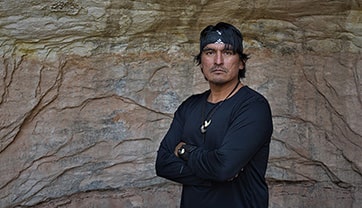PERRY R. JAMES-EDUCATION SPECIALIST AT UNM-GALLUP'S CENTER FOR ACADEMIC LEARNING-REFLECTS ON HIS JOURNEY TO RECENTLY ATTAINING A DOCTORAL DEGREE IN EDUCATIONAL LEADERSHIP.
Categories: Students Faculty Staff
Perry R. James is a full descent Navajo (with four original clans), a traditionalist, and a fluent speaker of the Navajo tribe. His work as a leader, warrior, educator, researcher, and writer is familiar with Indigenous ways of knowing related to a place-based context. This place-based context creates a sense of sacred place, story/songs, ceremony, history, ecological sustainability, and philosophy essential to the Navajo's survival. He serves as an education specialist at UNM-Gallup’s Center for Academic Learning.
Here, he reflects on his journey to recently attaining his Ed.D. in Education Leadership with an emphasis in leadership for change and minor in dual language.
BY PERRY R. JAMES
February 4, 2021 - Before earning degrees through higher education (bachelor, graduate, and postgraduate studies), I proudly served as a paratrooper in the U.S. Army in Fort Bragg, North Carolina. Airborne school is a functional training designed to qualify selected soldiers in the use of the parachute as a means of deployment, and through mental and physical training, to develop leadership, self-confidence, and a warrior spirit. Throughout my short military career, I have found that training is the cornerstone of military life. Whether it lasted one day, several weeks, or even months, every training event measures how ready individual soldiers, teams, units, and larger collective organizations perform their respective missions. This soldier's warrior spirit is my driving force in life and in earning my bachelor's, graduate, and postgraduate studies.
A couple of years after my Honorable discharge from the Army, in the summer of 2008, I began pursuing my higher education at Diné College (Tribal College) in Navajo studies. While pursuing Navajo studies, I became more aware of my culture, sacred spaces, ceremony, history, ecological sustainability, and philosophy essential to the Navajo's worldview. Moreover, in the fall of 2010, I transferred to the University of New Mexico-Gallup branch, where I majored in Bachelor of University Studies (BUS). In the BUS program, I studied Native American Studies and American Studies and earned my bachelor's in 2012. I believe Native American Studies is a much needed new, high quality, and relevant program that should be offered again at UNM-Gallup. After being away from academia for one year, I enrolled in the Master of Arts program in Navajo Culture, Language, and Leadership program at Navajo Technical University (NTU) and graduated in 2015. In 2017 I began teaching as an adjunct at NTU in the Navajo studies program and was hired as a full-time employee with NTU in 2018-2019.
While employed with NTU, I attended a Research Conference and met the Dean, School of Leadership Studies from Fielding Graduate University (FGU), Santa Barbara, California. As we got more acquainted and learned more about my background as an educator and Indigenous scholar, she insisted I apply for the doctoral program in Education Leadership with FGU and eventually accepted into the program in the fall of 2018.
For my dissertation, using an autoethnography and Indigenous research methodology, I investigated the question: "What learning and learning processes relating to the traditional Sweat House is relevant to Navajo leaders as relates to the needs of the Navajo Nation?" It offers personal reflections about my Sweat House experience and sacred Sweat House knowledge to reshape the existing "leadership" approach currently guiding the Navajo nation that reflects European conceptions of hierarchy. Leadership is understood differently in traditional Navajo ways. I contend that the kind of leadership of the forgotten Navajo way of being in the world can reverse many of the problems Navajo people currently suffer, exacerbated by contemporary leaders who have forgotten or have dismissed our forgotten worldview.
Further, my study identified lessons and ways to learn more lessons from the Sweat House in hopes that future Navajo leaders can better understand its potential for positive transformations. Overall, in my dissertation, I recognized how tapping into more Indigenous perspectives, more authentic experience, reflection, and more creative abilities could address problems and make the world a better place.
This accomplishment in drawing from my culture and other Indigenous scholars worldwide instills pride, justice, and respect for all living species on earth. I further believe it honors Indigenous researchers' voice, experience, creativity, and authority and focus more on essential questions than on the research methodologies and regard the people's version of reality that reveal virtues of generosity, patience, courage, respect, humility, and fortitude.
Latest News
Campus Clinic offers accessible care at UNM-Gallup
Advancing our communities at the Legislature
UNM-Gallup honors Martin Luther King Jr.'s legacy
Zollinger Library February Events
The University of New Mexico - Gallup
705 Gurley Ave.
Gallup, NM 87301
(505) 863-7500
Explore more News options:
UNM-G News UNM-G Events Speakers Bureau Press Release Archives



